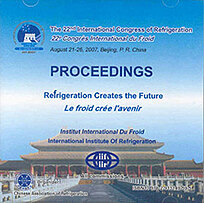
IIR document
Freezing osteoblast cells attached to hydroxyapatite discs and glass coverslips: mechanisms of damage.
Author(s) : LIU B. L., MCGRATH J.
Summary
Damage mechanisms for osteoblast cells attached to hydroxyapatite discs and glass coverslips were comprehensively investigated. The inverse U shape curves of survival versus cooling rates were obtained with the maximum survival much lower than that of isolated osteoblast cells. Cell-cell, cell-matrix interaction may alter the cryobiological properties of cells. Attached cells were subject to more severe mechanical forms damage than isolated cells because attached cells have larger contacting area with ice and the three dimension movements of isolated cells make them more flexible than attached cells that can only deform in one dimension. Results show that solute effects result in cells injury at slow cooling rate (1°C/min), while extracellular ice, differential thermal contraction, and mechanical stresses damaged the cells at high cooling rate (5, 10, 20°C/min). No intracellular ice formation was found in this study. The immunostaining of actin filaments can qualitatively reveal the mechanical damage. It may be possible to quantitatively relate the cell survival to their spreading area.
Available documents
Format PDF
Pages: ICR07-C1-1329
Available
Public price
20 €
Member price*
Free
* Best rate depending on membership category (see the detailed benefits of individual and corporate memberships).
Details
- Original title: Freezing osteoblast cells attached to hydroxyapatite discs and glass coverslips: mechanisms of damage.
- Record ID : 2007-2826
- Languages: English
- Source: ICR 2007. Refrigeration Creates the Future. Proceedings of the 22nd IIR International Congress of Refrigeration.
- Publication date: 2007/08/21
Links
See other articles from the proceedings (839)
See the conference proceedings
Indexing
- Themes: The influence of refrigeration on cells, tissues and organs
- Keywords: Ice; Cell; DMSO; Bone; Cryopreservation; Cryofreezing; Crystallization
-
VISUALIZATION OF FREEZING DAMAGE TO BIOLOGICAL ...
- Author(s) : ENGLICH S., KORBER C., RAU G.
- Date : 1987/08/24
- Languages : English
- Source: Development in refrigeration, refrigeration for development. Proceedings of the XVIIth international Congress of Refrigeration.
- Formats : PDF
View record
-
Bio-inspired cryopreservation using synthetic p...
- Author(s) : BAILEY T. L., OTTEN L. C., GIBSON M. I.
- Date : 2016/09/08
- Languages : English
- Source: 2nd IIR Workshop on cold applications in life sciences.
- Formats : PDF
View record
-
Special equipment for cryopreservation of tissu...
- Author(s) : SPÖRL G., KLINGNER E., QUINGER J.
- Date : 2008/04/21
- Languages : English
- Source: Cryogenics 2008. Proceedings of the 10th IIR International Conference
- Formats : PDF
View record
-
Kryokonservierung und Langzeitlagerung von Nabe...
- Author(s) : EGGER D.
- Date : 2009/11/18
- Languages : German
- Source: Deutsche Kälte-Klima-Tagung: 2009, Berlin.
View record
-
Cryo-hanging drops: towards ready-to-use frozen...
- Author(s) : MEISER I., SCHMIDT K., NEUBAUER J., et al.
- Date : 2017/05/15
- Languages : English
- Source: Cryogenics 2017. Proceedings of the 14th IIR International Conference: Dresden, Germany, Mai 15-19, 2017.
- Formats : PDF
View record
